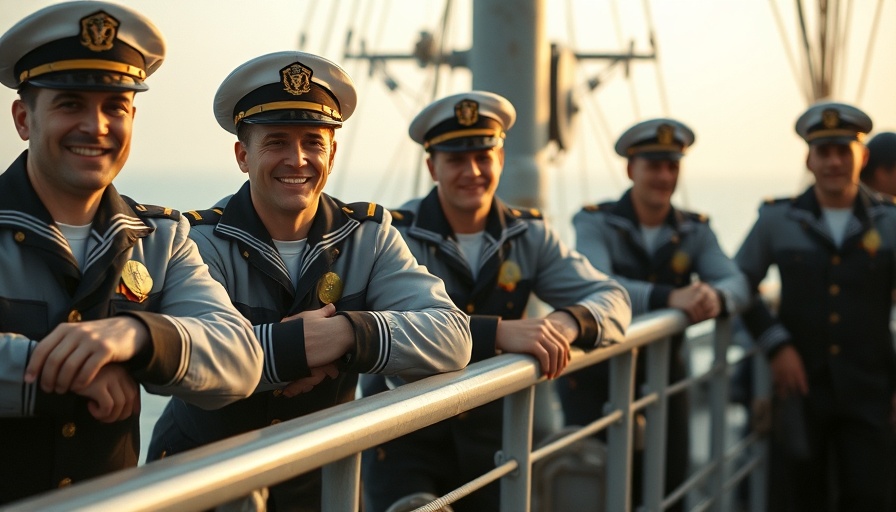
The Timeless Charm of Mister Roberts (1955)
Mister Roberts (1955) is more than just a film; it’s an enduring testament to the human spirit during the trials of World War II. Directed by the legendary John Ford and adapted from Thomas Heggen's Pulitzer Prize-winning play, this classic effortlessly intertwines humor and drama aboard a cargo ship in the Pacific. As audiences step into the tightly wound world of Lieutenant Doug Roberts and his crew, they are awakened to themes of duty, camaraderie, and a quest for personal freedom.
Meet the Characters: A Blend of Humor and Humanity
At the heart of the narrative is Lieutenant Doug Roberts, portrayed with quiet intensity by the remarkable Henry Fonda. As the moral center of the crew, Roberts embodies the conflict between personal longing for glory and loyalty to his men. Stuck in the mundane overseer role of a cargo ship's operations—delivering items as trivial as toilet paper—his frustration becomes palpable and relatable. Fonda's performance not only captivates but also resonances deeply, making Roberts a character that will stay with audiences long after the credits roll.
In stark contrast is Ensign Frank Pulver, played brilliantly by Jack Lemmon, who adds much-needed comic relief and depth to the film. A lazy officer initially seen as cowardly, Pulver's journey unfolds with surprising tenderness, culminating in a moment of unforeseen bravery. Lemmon’s Academy Award-winning performance invites laughter as well as reflection, easily becoming a fan favorite.
Tension on Board: The Role of Captain Morton
Opposing Roberts's ideals stands Captain Morton, portrayed by James Cagney with a unique flair. Morton’s self-serving nature and obsession with his rank serve as a significant source of tension on the ship. He is not a typical villain but rather a reflection of authority’s complexities during wartime. Cagney's sharp performance encapsulates the struggle of a captain preoccupied with personal ambitions at the expense of his crew's needs, making his character both entertaining and frustrating.
Exploring Universal Themes: Frustration and Freedom
The brilliance of Mister Roberts lies in its exploration of deeper themes—how duty can entrap personal desires, and the sacrifices of individuals can foster unity among a group. The crew’s bonding moments and shared frustrations highlight the psychological toll of monotony, representing a microcosm of the larger military experience during a futile war. As Roberts pursues his desire for action, he forms an emotional bond with his crew, who eventually come to realize his selfless sacrifices.
Humor Amidst Strain: Finding Light in Dark Times
While the pressures of war loom large, the film continuously finds ways to inject humor, allowing audiences moments of relief. Whether through Pulver’s antics or exchanges among the crew, Ford captures the essence of human resilience. In a cinematic landscape that often leans toward drama, Mister Roberts successfully balances laughter with poignancy, reminding viewers of the importance of humor, even in the darkest of times.
Symbolism in Motion: The Palm Tree
One poignant symbol in the film is Captain Morton’s palm tree—a trophy awarded for trivial achievements. It serves both as a comedic prop and as a representation of the absurdity of their mission. This “trophy” stands in direct contrast to what the men yearn for—a chance to fight and serve meaningfully. When Lieutenant Roberts finally defies his captain and tosses the tree overboard, it is a pivotal moment that reflects both rebellion and the yearning for genuine accomplishment.
Legacy and Influence: Why Mister Roberts Still Matters
Mister Roberts has stood the test of time, illustrating the personal battles faced by those in uniform, far removed from battlefields. It evokes a nostalgic yet critical view of a close-knit military team, revealing how friendships form and strengthen in the face of adversity. Critically acclaimed for its narrative richness and character depth, it continues to resonate with contemporary audiences, breathing life into discussions about duty, authority, and what it means to be truly courageous.
Join the Conversation: Reflecting on Mister Roberts
As we reflect on the themes of Mister Roberts, we invite you to consider how its messages resonate with our lives today. What can we learn about duty, friendship, and the pursuit of freedom in our own communities? This film, with its rich characters and poignant humor, encourages modern audiences to think critically about the impact of leadership and camaraderie in all walks of life.
Whether you’re in the heart of Dallas or enjoying its vibrant entertainment scene, dive into Mister Roberts for a reminder of the resilience of the human spirit amidst the ordinary and extraordinary alike. Engage with your community around the themes presented in this classic film—discuss it, analyze it, and maybe even host a movie night!
 Add Element
Add Element  Add Row
Add Row 



 Add Row
Add Row  Add
Add 


Write A Comment